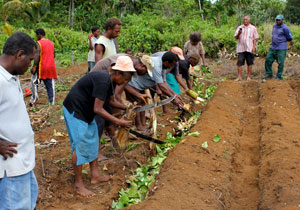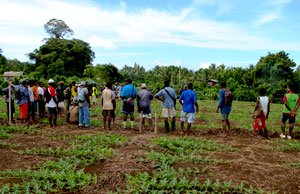Changes to farming techniques using mulching, composting and crop rotation is improving food production and the quality of produce being grown in Solomon Islands, says Kastom Gaden Association.
Kastom Gaden Association (KGA) Program Support Officer, Roselyn Kabu said since the introduction of new farming methods, more food is being produced without degrading the soil.
'More than 100 people in Takwa'a Village in North Malaita took part in a four-day workshop recently to learn about better farming methods to improve quality and quantity of food production,' Ms Kabu said.
'Some people walked for a day to get to the training, including people who live high up in the mountain regions, with many women and young people attending.'
KGA training on plant and livestock husbandry, farming methods, pest and disease management, nutrition, health and use of simple technologies to suit local conditions is starting to make a difference.
According to AusAID's livelihoods program manager in Honiara, Luke Simmons, Solomon Islanders are keen to learn new farming methods to help boost food production, quality and ensure long term food security.
'One of the key messages during the village training is that food security is also about generating income and not just subsistence, Mr Simmons said.
'People in highly populated areas can no longer rely on subsistence agriculture alone if they are to eat well and generate income for the necessities of life such as school fees and housing,' he said.
One of the major benefits of these farming methods is that people stop using slash and burn cultivation which degrades the soil and reduces production. By using crop rotation, mulching and composting, farmers can cultivate their gardens around their homes and use the same plots over and over again. This saves precious hours each day and is particularly beneficial to village women who do most of the gardening that supports their household.
KGA's training is also about getting people to see their farm as a business.
'This includes focusing on particular crops to gain a market premium. This means that better crops can be produced with better margins for the labour provided, like the watermelons from this region which are the talk of the Honiara market when they arrive over the Christmas period,' Mr Simmons said.
'Other messages included the need to plan and plant with the seasons to get the best results, but to also plant with the markets in mind. Farmers must know what regions are producing so that they can supply and get better prices when those regions cannot provide to the market.'
KGA also provides training and resources to farmers through partnerships with organisations such as women's groups and farmers associations. The message from Baetolau Farmers Association coordinator, Osanti Luda was that everyone needs to work smarter to improve the soil to get better results.
'If your soil is poor, you can work hard but you won't get good results. I have been using chicken manure, composted seaweed, crop rotation and mulching to improve the soil. It has helped me grow great watermelons, even a record size 78cm long water melon using the same soil used for crops for the last 30 years. The difference is the soil preparation,' Mr Luda said.
AusAID recently signed a new three year funding agreement with KGA. The SBD20.18 million (A$2.53 million) agreement extends previous Australian support for KGA's program Strengthening Food Security for Rural Livelihoods. This is providing thousands of families with improved varieties of food crops and advice on more effective farming methods and family nutrition.
'With more than 84 per cent of Solomon Islanders living in rural areas, KGA's services reach some of the most isolated areas of the country. This is working to improve the amount of quality food grown in rural areas, create jobs and generate income for all Solomon Islanders,' Mr Simmons said.
More information
Australia's aid program in the Solomon Islands


